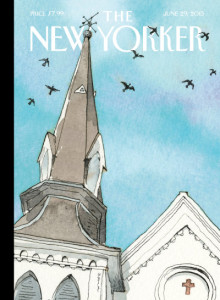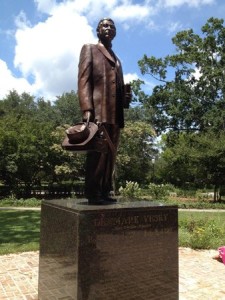Terrorism in Charleston

When I heard of the shooting at the Emanuel AME Church in Charleston on June 17, I realized that I had read about that Church recently. On page 155 of Sue Monk Kidd’s novel, The Invention of Wings, the fictional slave named Handful begins attending meetings there with Denmark Vesey. Vesey was a historical figure mentioned in several recent editorials. He was a free black who had attempted a slave revolt in Charleston almost 200 years ago. Kidd incorporated several real people and events in her novel. In the novel, the local militia raid the church and take Handful and Vesey to the Work House to tread a mill that grinds corn. Handful slips on the machinery and incurs an injury that cripples her. In the historical record, Vesey was hanged and the church he founded in 1816, was burned to the ground, though it was later rebuilt.
Nine members of Emanuel church–outstanding, faithful people–were murdered on June 17. On the New Yorker cover Barry Blitt represented them as blackbirds flying to heaven from that church. If only they could have invented wings and flown free before they were killed.
Taking down the Confederate flag, at long last, is but a first step toward reconciliation. Keeping guns out of the hands of people who misunderstand their own history will be much more difficult. The Invention of Wings presents a vivid, intimate view of slave/white relationships. I am hopeful that Oprah’s upcoming movie of this book will promote wider understanding and compassion, as did the movies, Twelve Years a Slave and Selma. For we will never overcome racism until we stop ignoring our heritage of slavery, as Cortland Milloy points out in the Washington Post.

Charleston is a wonderful place to visit. In June 2007 I spent several days at the annual Spoleto Music Festival. The city has recently tried to balance some of its shameful history, according to this Washington Post article. But seeing historic landmarks and interpreting them are not the same. A more recent Washington Post feature shows that Dylann Roof’s own tour of Southern history landmarks served to bolster his ideas about white supremacy. Yet another Post article reports a struggle in Texas over how school textbooks should tell the story of the Civil War and its aftermath.
As Dylann Roof did at Emanuel, Nina Pitkin and I received a warm welcome at Shiloh Baptist Church in Fredericksburg, Virginia in November 2013. Of course, we came to learn, not to shoot. We were taking a self-guided Black History tour and found their door open. They graciously invited us to join them for lunch. We sampled the Bean Pie made by Sister Lateefah Muhammad, who was giving a workshop on nutrition. A special treat was meeting Johnny Johnson, a local artist, whose colorful work we had noticed in the entrance hall. We also saw the Auction Block that was used with slaves prior to the Civil War and a 2013 sculpture commemorating the 150th Anniversary of the Emancipation Proclamation. If only Dylann Roof had come to Emanuel to learn, rather than to shoot.
They met to read the Bible,they gathered for a prayer,They worshiped God and shared with friendsand welcomed strangers there.They went to church to speak of love,to celebrate God’s grace.O Lord, we tremble when we hearwhat happened in that place.O God of love and justice,we thank you for the nine.They served in their communitiesand made the world more kind.They preached and sang and coached and taught,and care for children, too.They bless your church and blessed your worldwith gifts they used for you.We grieve a wounded culture,where fear and terror thrive,where some hate others for their raceand guns are glorified.We grieve for sons and daughters lost,for grandmas who are gone.O God, we cry with broken hearts:this can’t continue on!God, may we keep on sowingthe seeds of justice here,till guns are silent, people sing,and hope replaces fear.May seeds of understanding growand flourish all our days.May justice, love and mercy bethe banner that we raise.
Leave a Reply to Fran Bell Simms Cancel reply